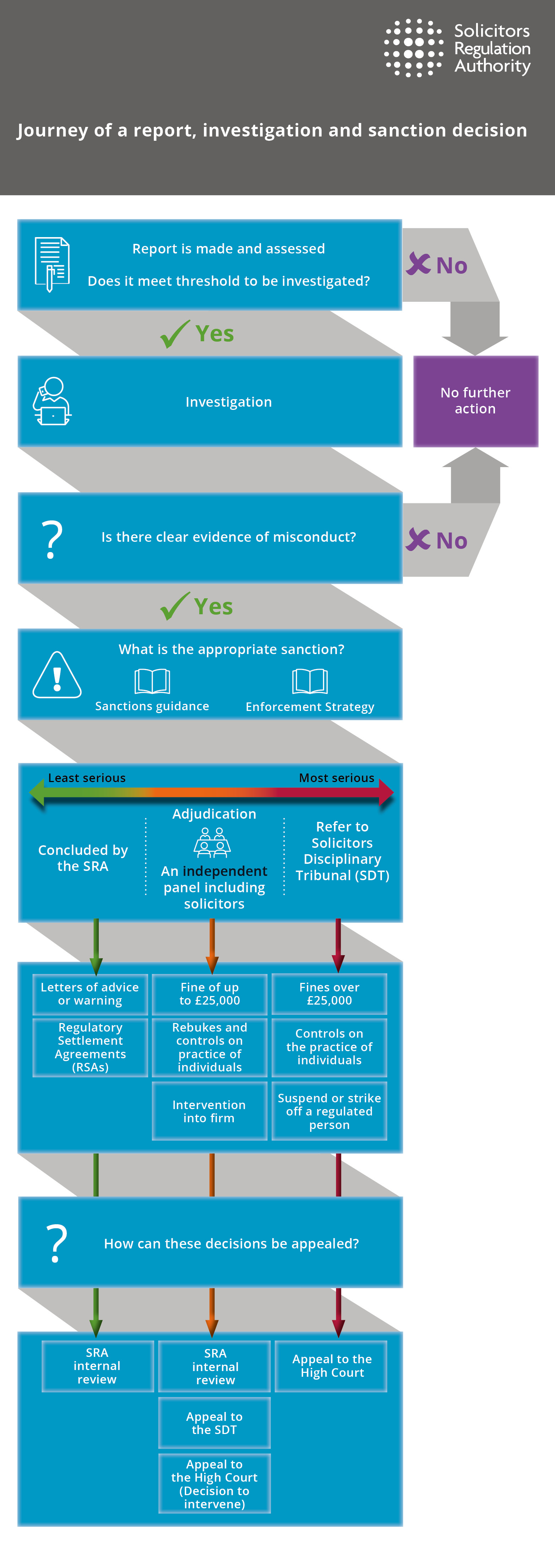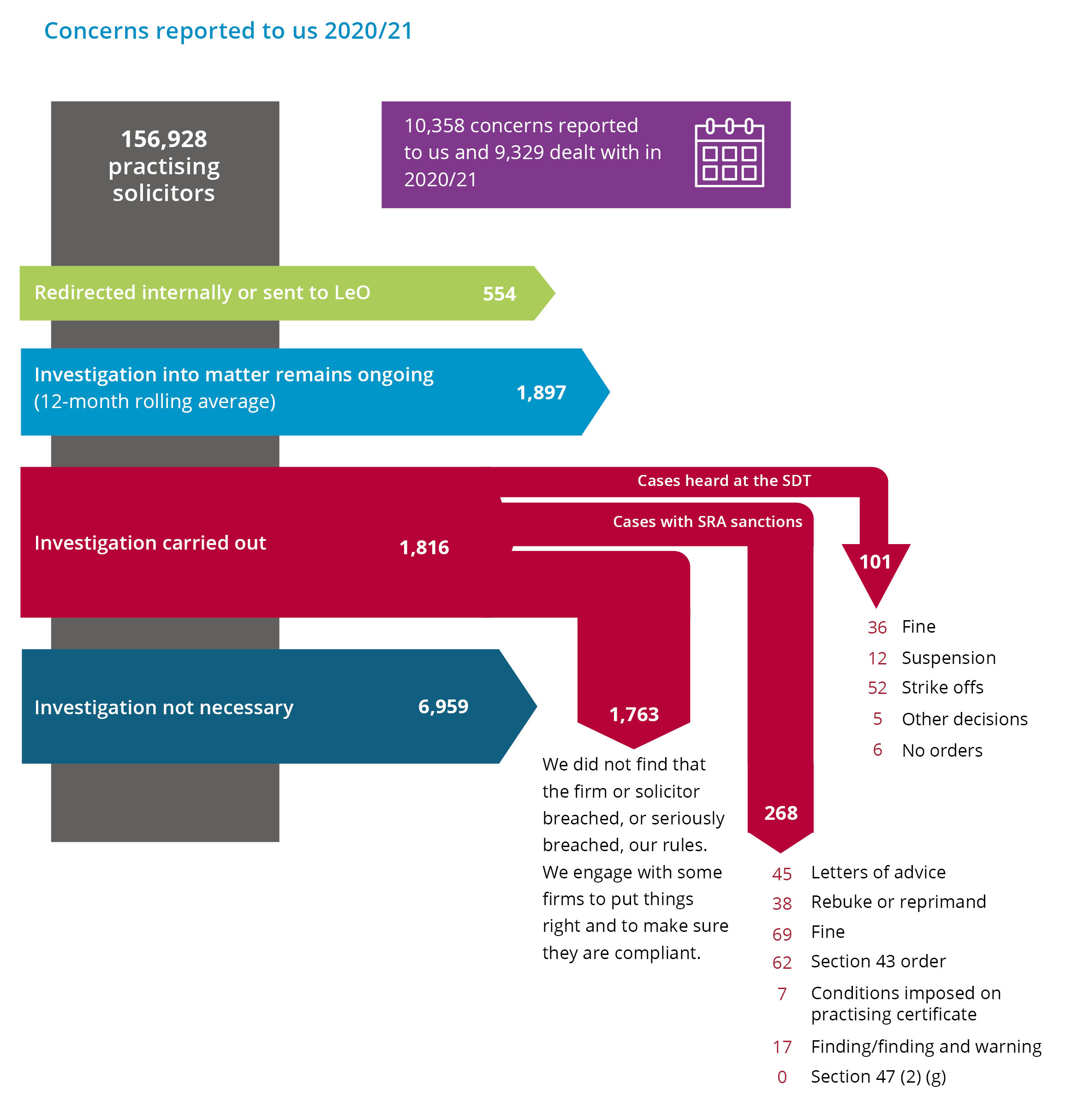Statement
Financial penalties
22 August 2022
The overwhelming majority of solicitors do a good job and meet the high standards we all expect. But when things go wrong we can, and do, step in to make sure clients are properly protected.
Our current regime was brought in more than 10 years ago and there have been significant changes since, including the 2019 introduction of our new Enforcement Strategy. You can read more about our enforcement work in the dedicated section on our website, and we cover the detail annually through our Upholding Professional Standards report.
Earlier in the year, we consulted on several proposals relating to our fining powers, aiming to take steps that would help to resolve cases as quickly and effectively as possible, reducing stress and cost for all those involved, while maintaining proper safeguards. With effect from 20 July 2022, the Ministry of Justice increased our fining powers from £2,000 to up to £25,000 for ‘traditional’ firms and the solicitors who work in them. This statement sets out our processes, what is changing, and what we are proposing to change in the future.
What currently happens when we receive a complaint?
We receive more than 10,000 complaints a year about the firms and individuals we regulate – a small number relative to the overall scale of legal work and activity, with the consumer law market value estimated at almost £22bn in 2021.
We assess each complaint and make a decision about whether we need to investigate – in 2020/21 we referred about 1,800 matters for investigation. We give everyone who is subject to an investigation early notification of the nature of the complaint made and the issues that we are investigating. At the end of an investigation, we give them the opportunity to make representations before any decision is taken – having seen a notice setting out the allegations, evidence and recommended action – and we consider any representations as part of our decision-making process.
An important part of our enforcement work is the use of financial penalties. Our current procedure for imposing internal fines and other regulatory sanctions safeguards the independence of decision-makers by keeping separation between those who investigate and those who adjudicate on cases. Fines are imposed by legally-qualified adjudicators, who are functionally separate from our operational teams, and are appointed to make objective and impartial decisions using our approach to financial penalties guidance. The schedule of delegation for these decisions is outlined on our website in our decision-making framework and in the graphic below.
At the moment a case will be heard at a panel meeting (our pool of panel adjudicators consists of lay and legally-qualified individuals, with panels of two or three members) if certain criteria are met, for example if the case is particularly high profile, sensitive or complex.
Fines can also be agreed through a regulatory settlement agreement (RSA) in which the respondent agrees the case against them, including the appropriate level of fine.
The majority of concerns do not result in us taking enforcement action because, in many cases, we can resolve matters through engagement. In many others, we find that the solicitor or firm has not breached our rules. In terms of concerns that do result in a sanction, 2020/21 saw around 100 cases referred to the Solicitors Disciplinary Tribunal (SDT) and we imposed 268 internal sanctions, of which 69 were fines. Any fines levied by us or the SDT go to HM Treasury.
What’s changing? Enhancing our fining powers
We know that being involved in our enforcement processes is stressful, particularly as matters can take a long time to sort out. We are committed to reviewing and improving our processes to make them as timely, streamlined, open and fair as we can.
As part of our work to improve what we do, we consulted on a range of proposals in relation to our fining powers, aiming to take steps that would help to resolve cases as quickly and effectively as possible while maintaining proper safeguards, reducing stress and cost for all those involved.
The proposals were based on evidence from our experience of enforcement over the last 10 years. The consultation sought views on proposals to: increase the maximum fine we can issue for ‘traditional’ firms and those who work in them up to £25,000; take into account the turnover or income of firms and individuals when setting fines; and introduce a schedule of 'fixed penalties' of up to £1,500 to enable lesser issues to be dealt with more easily for all concerned. Introducing 'fixed penalties' for certain lower-level misconduct would not only allow more straightforward issues to be dealt with more easily for all concerned, but it would also provide greater transparency and consistency in how penalties were applied.
With effect from 20 July 2022, the Ministry of Justice increased our fining powers from £2,000 to up to £25,000 for ‘traditional’ firms and the solicitors who work in them. This does not impact on alternative business structures and the individuals working in them, for which we can already impose fines of up to £250m and £50m respectively. In the longer term, we would like to be aligned with the other legal regulators, whose fining powers are not limited.
The uplift in fining powers means that fewer cases will need to go to the SDT, an independent tribunal that is able to impose greater fines than we can, as well as to suspend solicitors and to strike them from the roll. Increased internal fining levels will help us to resolve cases more quickly, saving all concerned time, stress and costs.
Recognising that higher powers bring with them the need for greater accountability, we are bringing together information about our financial penalties and the changes in this statement, alongside our second consultation on our fining powers, so everyone is clear about what is happening. We are reviewing our processes to make sure we are using the new powers as openly and fairly as possible, with appropriate safeguards, quality assurance and controls. As part of this, we are now consulting on certain changes we are proposing to make to our rules.
Applying the new fining powers
We will apply the increased fining powers to all cases where we consider a fine is appropriate, except for those where, as at 20 July, we had already sent a notice to the respondent proposing to refer the case to an SRA adjudicator or the SDT.
For fairness and consistency, those cases will continue to be dealt with as set out in the notice - unless we agree a regulatory settlement in which the respondent agrees the case against them, including the appropriate level of fine up to the new level.
Importantly, solicitors and firms can appeal any outcome or penalty we impose to the SDT.
We do, of course, also retain the discretion to refer a case to the SDT for a full hearing in relation to breaches where there is potential for an outcome of a fine of less than £25,000, where we judge this to be more appropriate. This may be, for example, where there are more serious connected considerations, or the facts are disputed and cannot be resolved without oral evidence tested through a hearing process.
Improving transparency in our decision making
The need to address the transparency and robustness of our processes – showing how we meet high standards and demonstrating a clear separation between those investigating and those determining the outcome and sanction – was raised in feedback to our consultation and we agree. We are, accordingly, taking rigorous steps to improve the openness and robustness of our procedures.
- We will introduce new arrangements that mean that all RSAs where the firm or individual agrees a fine of over £2,000 will be approved by senior staff.
- We will publish an updated version of our Schedule of Delegation (which sets out who makes which decisions) in a format that is more accessible for everyone.
- We are proposing clarifying our rules for when our adjudicators may interview a respondent or a witness, or conduct a hearing, which it may decide should be held in public.
- We are also proposing to introduce explicit rules (rather than relying on the schedule of delegation) to clarify that all fines are imposed (unless agreed) by adjudicators. We are also proposing that in future, as an additional safeguard, we also use a panel (which will include a lay adjudicator) rather than single legal adjudicator, for fines in the most serious band.
- We are proposing to amend our rules to make sure that referrals can be rescinded in a more streamlined way and that any adjudicator decisions can only be reviewed by other adjudicators or adjudicator panels.
- We will be consulting on and publishing guidance on our decision-making processes and procedures, to better demonstrate the existing functional separation and the independence of the adjudication function as well as the safeguards in place to ensure a fair and transparent process.
- And we are working closely with the SDT to develop a shared understanding of how we both determine what represents a serious case, appropriate levels of fining, and agreeing what our criteria for referring a matter to the Tribunal should be. We are planning to publish a joint statement on this in due course so that everyone is clear on the position.
Improving how we publish information on the decisions we take
We have just concluded a consultation on what information we publish about the disciplinary decisions we make. The consultation asked for views on whether our current approach strikes the right balance between protecting the best interests of the public, while being fair and proportionate to the profession. We will feed back on what was said and next steps in due course.
We will also be publishing additional detail on the fines we issue in our annual Upholding Professional Standards report, including on how we have used our increased fining powers.
Improving other areas of our financial penalties work
We are also moving forward with the rest of our proposals, which were to:
- Take into account, in all cases, the turnover of firms and financial means of individuals when setting fines. This could mean, for example, issuing a junior lawyer and senior partner - who have committed the same misconduct - with different fine levels to take account of their financial situations.
- Introduce a schedule of ‘fixed penalties’ for lower-level breaches – enabling cases to be dealt with more quickly for all concerned. These penalties would mostly deal with lesser or administrative breaches – such as failures to comply with requests for information or requirements under the SRA Transparency Rules. We will publish full details and criteria so people know what to expect. Again, this will help with the pressure and stress inevitably associated with an investigation.
- Amend guidance to highlight that for cases involving sexual misconduct, discrimination or any form of harassment, financial penalties will only be considered in exceptional circumstances, with restrictions on practice, suspension or strike off the more appropriate sanction.
We are currently consulting on the detailed rules and guidance required to implement these changes. We are also consulting on piloting the use of victim impact statements for cases involving sexual misconduct, discrimination or any form of harassment.
Taken together, the steps we have set out above will make a major contribution to our commitment to improving our processes, making them as timely, streamlined, open and fair as possible. We will continue to keep our processes under review and are planning formal evaluation of any changes we are making.


